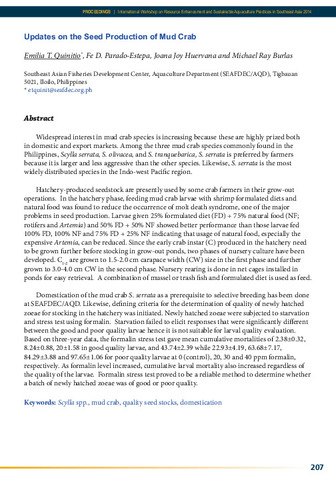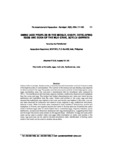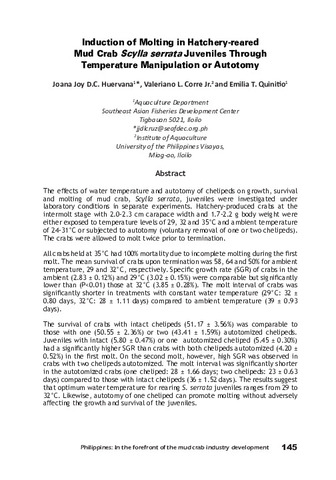Comparative transcriptome profiling of heat stress response of the mangrove crab Scylla serrata across sites of varying climate profiles
Share
| dc.contributor.author | Shrestha, Anish | |
| dc.contributor.author | Lilagan, Crissa Ann I. | |
| dc.contributor.author | Guiao, Joyce Emlyn B. | |
| dc.contributor.author | Romana-Eguia, Maria Rowena R. | |
| dc.contributor.author | Ablan Lagman, Ma. Carmen | |
| dc.date.accessioned | 2021-08-02T00:58:04Z | |
| dc.date.available | 2021-08-02T00:58:04Z | |
| dc.date.issued | 2021 | |
| dc.identifier.citation | Shrestha, A. M. S., Lilagan, C. A. I., Guiao, J. E. B., Romana-Eguia, M. R. R., & Ablan Lagman, Ma. C. (2021). Comparative transcriptome profiling of heat stress response of the mangrove crab Scylla serrata across sites of varying climate profiles. BMC Genomics, 22(1), 580. https://doi.org/10.1186/s12864-021-07891-w | en |
| dc.identifier.uri | http://hdl.handle.net/10862/6169 | |
| dc.description.abstract | Background: The fishery and aquaculture of the widely distributed mangrove crab Scylla serrata is a steadily growing, high-value, global industry. Climate change poses a risk to this industry as temperature elevations are expected to threaten the mangrove crab habitat and the supply of mangrove crab juveniles from the wild. It is therefore important to understand the genomic and molecular basis of how mangrove crab populations from sites with different climate profiles respond to heat stress. Towards this, we performed RNA-seq on the gill tissue of S. serrata individuals sampled from 3 sites (Cagayan, Bicol, and Bataan) in the Philippines, under normal and heat-stressed conditions. To compare the transcriptome expression profiles, we designed a 2-factor generalized linear model containing interaction terms, which allowed us to simultaneously analyze within-site response to heat-stress and across-site differences in the response. Results: We present the first ever transcriptome assembly of S. serrata obtained from a data set containing 66 Gbases of cleaned RNA-seq reads. With lowly-expressed and short contigs excluded, the assembly contains roughly 17,000 genes with an N50 length of 2,366 bp. Our assembly contains many almost full-length transcripts – 5229 shrimp and 3049 fruit fly proteins have alignments that cover >80% of their sequence lengths to a contig. Differential expression analysis found population-specific differences in heat-stress response. Within-site analysis of heat-stress response showed 177, 755, and 221 differentially expressed (DE) genes in the Cagayan, Bataan, and Bicol group, respectively. Across-site analysis showed that between Cagayan and Bataan, there were 389 genes associated with 48 signaling and stress-response pathways, for which there was an effect of site in the response to heat; and between Cagayan and Bicol, there were 101 such genes affecting 8 pathways. Conclusion: In light of previous work on climate profiling and on population genetics of marine species in the Philippines, our findings suggest that the variation in thermal response among populations might be derived from acclimatory plasticity due to pre-exposure to extreme temperature variations or from population structure shaped by connectivity which leads to adaptive genetic differences among populations. | en |
| dc.description.sponsorship | This work was funded by the Department of Science and Technology Philippine Council for Agriculture and Aquatic Resources Research and Development (DOST-PCARRD) Mangrove Crab Program to De La Salle University-Manila through MCAL. AMSS was partially funded by University Research Coordination Office, De La Salle University-Manila. The funders had no role in study design, data collection, and analysis, decision to publish, or preparation of the manuscript. | en |
| dc.language.iso | en | en |
| dc.publisher | BioMed Central | en |
| dc.relation.uri | https://bmcgenomics.biomedcentral.com/track/pdf/10.1186/s12864-021-07891-w.pdf | en |
| dc.rights | Attribution 4.0 International (CC BY 4.0) | |
| dc.rights.uri | http://creativecommons.org/licenses/by/4.0/ | * |
| dc.subject | Scylla | en |
| dc.subject | Scylla serrata | en |
| dc.subject | RNA sequence | en |
| dc.subject | heat stress | en |
| dc.title | Comparative transcriptome profiling of heat stress response of the mangrove crab Scylla serrata across sites of varying climate profiles | en |
| dc.type | Article | en |
| dc.citation.volume | 22 | |
| dc.citation.issue | 1 | |
| dc.citation.spage | 580 | |
| dc.citation.journalTitle | BMC Genomics | en |
| dc.subject.asfa | profiling | en |
| dc.subject.asfa | proteins | en |
| dc.subject.asfa | gene expression | en |
| dc.subject.asfa | RNA | en |
| dc.subject.asfa | crab culture | en |
| dc.subject.asfa | rna sequencing | en |
| dc.identifier.essn | 1471-2164 | |
| dc.identifier.doi | 10.1186/s12864-021-07891-w | |
| dc.subject.scientificName | Scylla serrata | en |
| local.subject | Mud crab | en |
| local.subject | Mangrove crab | en |
| local.subject | Scylla | en |
| local.subject | RNA-seq | en |
| local.subject | Transcriptome assembly | en |
| local.subject | Heat stress | en |
Files in this item
| Files | Size | Format | View |
|---|
This item appears in the following Collection(s)
-
AQD Journal Articles [1214]
These papers were contributed by AQD staff to various national and international journals




